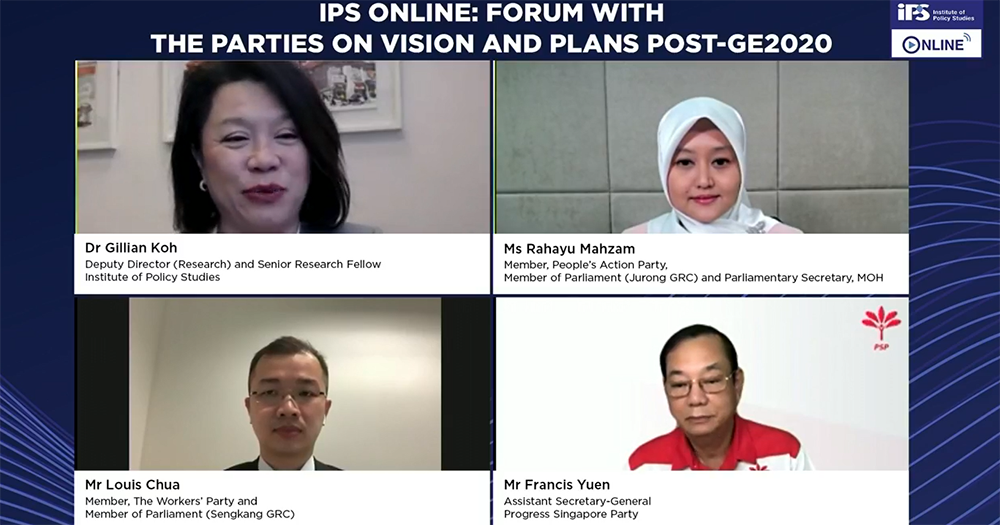While there is still a need for foreign talent in Singapore to develop its human capital, Singaporeans must also have the opportunity to step up to leadership roles.
These were the common points that Rahayu Mahzam from the People's Action Party (PAP), Louis Chua from the Workers' Party and Francis Yuen from the Progress Singapore Party (PSP) agreed upon on Oct. 22, at an online forum hosted by the Institute of Policy Studies (IPS) with its Deputy Director of Research, Gillian Koh, serving as the moderator.
In addition, all three party representatives also agreed that it was important to ensure a transfer of skills and knowledge to Singaporeans, so as to ensure that they are eventually able to step up to leadership roles.
Here's how each of the participants elaborated on their parties' respective positions.
Rahayu: Balance between discrimination and being open must be struck
Rahayu, who is Parliamentary Secretary for Health, noted that, "the issues surrounding work, job opportunities, are something that is seized in the minds of Singaporeans right now, especially during difficult times like this."
However, because of the country's reliance on human capital, it is crucial to ensure that Singapore has the necessary support, knowledge and skills to build the economy.
She added that Singaporeans were generally not opposed to bringing in foreign talent. She said that Singaporeans were cognisant of the need to bring in foreign talent where "our markets in certain areas are still very new, still need to be developed, still need to be supported."
The Jurong GRC MP also highlighted that both small and medium enterprises and multi-national companies are dependent on such talents to help build their businesses.
She cautioned, "If we make everything so tight and difficult, it's not something that will be attractive because companies have a lot of other options in Asia now."
However, the government must also ensure that Singaporeans are "not shortchanged and glossed over in opportunities that they very well deserve," she further stated.
Rahayu said that the Ministry of Manpower had been "very, very diligent" in looking into this issue, and emphasized that specific instances of unfair practices and discrimination should be dealt with.
Rahayu reiterated the need to strike a balance on unfair employment practices and discrimination:
"We cannot be closed. When there is a problem and there is discrimination, deal with it. But, as a matter of being inclusive, as a matter of being open, as an economy, we should maintain."
Louis Chua: Crux of the matter lies in a skills gap and shortage
Meanwhile, Chua said that while he did not believe Singaporeans were inherently xenophobic against foreigners, the crux of the matter lay in a skills gap and shortage which requires foreigners to "top up."
Given that Singapore has one of the best education systems in the world, with universities "at the top of the university ranking tables", one must wonder why Singaporeans do not have the necessary skillsets to perform certain roles, he stated.
Chua then drew on his own experience in the finance industry.
He highlighted how the proportion of Singaporeans in senior leadership roles within the industry had remained more or less the same, despite the country's status as a financial hub.
This raised the following question:
"How then do we...enable more Singaporeans to step into these roles and make sure that we are equipped with the right skills and given the opportunity in the first place to step into these roles. I think this is something which we need to continue to work on as well."
Francis Yuen: Foreign talent needed as catalyst but should serve as cheap means of production
As for Yuen, he clarified that the position of the PSP was as such:
"We are not against foreign talent. Foreign talent is needed to complement, to serve as a catalyst, but foreign talent should not be here to replace local talent, when local talent can do the job."
On this point, he elaborated that it was important for Singapore to have talent "that it did not have", as well talent that could bring about a cross-fertilisation of ideas so as to challenge Singaporeans to improve to another level.
However, it is also important to ensure:
"We should not have a system where foreign workers are brought in because they are cheap, and therefore its expedient for a business to lower their cost based on the fact that they are cheaper to employ. That is the wrong basis."
Here, Yuen, in a manner similar to Chua, drew on his own experience as the President of Honeywell's Asia region, and added that his company made it a point to localise their positions in countries such as Korea, Australia and India by training local directors and Vice-Presidents.
He added, "It's costly to keep on employing foreigners who are not passing down the skill to the next level."
This means thinking about how companies can be incentivised to localise, and ensuring that there is a transfer of skills.
Yuen acknowledged that there would be a certain tension with such a measure however.
He stated:
"Of course there is also this tension between being attractive for companies to come in...because of the cheaper costs of producing, and being expensive to stay because if you localise, your labour costs will climb."
Totally unrelated but follow and listen to our podcast here
Top image screenshot from IPS Facebook
If you like what you read, follow us on Facebook, Instagram, Twitter and Telegram to get the latest updates.
